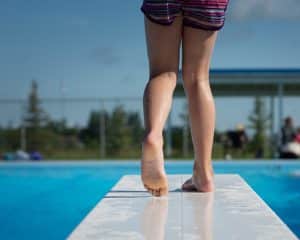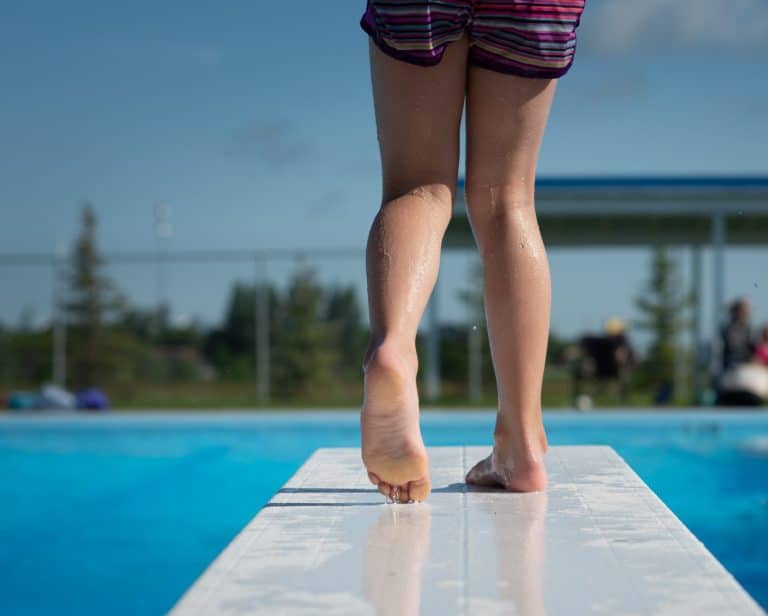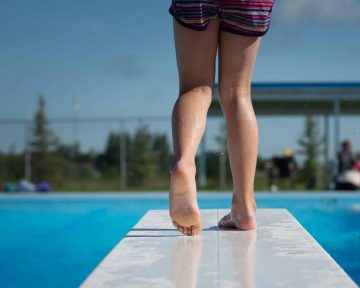“Raise your kids in the church or else they will go off the deep end in life.”
“Did you hear that he left the church? His kids are going to go off the deep end.”
“That child has gone off the deep end hasn’t she?”
The deep end. I often hear this phrase used as a metaphor for temptations teenagers and young adults succumb to. Often it’s said in relation to the parents’ choices. Such as, “If only the parents had done (fill in the blank), the child wouldn’t have gone off the deep end.”
The metaphorical deep end seems to be full of dangers that lead to spiritual death. The dangers vary depending on the people in the conversation. Usually the dangers seem to include things such as: dressing immodestly, drug use, teen pregnancy, tattoos, swearing, alcohol addiction, pornography, and so on. The message is clear, we are meant to be scared of the deep end. To stay away from it. To keep our kids as far from it as possible.
Recently someone used the phrase around me and I had a new thought, “But I’m not scared when my kids go in the real deep end of the pool.”
My children are at home in the water. When they were small we lived in Alabama, and we went to the neighborhood pool to beat the heat. I thought about putting them in swim lessons. But my sister told me, “just go swimming a lot as a family. They will learn everything they would learn in beginner swim lessons.” She was right. They learned to enter and exit the water carefully, to put their heads underwater, and to jump into the water.
We no longer live in Alabama, but access to a pool continues to be a summer staple. My children took some swimming lessons, but most of their confidence in the water comes from repeated exposure to it. We go to the pool often and they’ve learned to swim as a result.
All four of my children are able to pass the swim check at our city pool and earn the right to play in the 12 foot deep end. I love watching them play. They confidently jump off the diving board, fully trusting their bodies to bring them back to the surface of the water. Their strong arms and legs cut through the water moving them where they want to go. They pull themselves out of the water and go back to the diving board. Over and over again.
At first I was a little nervous when my children started playing in the deep end. My twin girls passed the swim check three summers ago when they were only nine. They seemed so small compared to the bigger children and teenagers that played in the deep end. But they held their own.
My son also passed the swim check at age nine. I hovered around the edges of the pool the first few times he played in the deep end. He has some communication issues so I wanted to be near in case the lifeguard needed to talk to him. But after a while I was sure that everything would be okay.
My youngest passed the test when she was seven. It felt a little like a fluke and I anxiously watched as she confidently went off the diving board. She didn’t share my fears, she came out of the water triumphant and went back for another jump. I saw that she belonged in the deep end as much as anyone else.
As I think about how confident my children are in the deep end of the pool I wonder if there is a way to teach them to safely navigate the deep end of life.
I think it’s similar to how I taught them to be safe at the pool. I didn’t just toss my kids into the pool the first time we went swimming. I went in with them. I’d catch them as they jumped into my arms from the side of the pool. When my husband could join us at the pool he’d give pointers on how to swim. When extended family members came to visit we’d head to the pool and cousins and aunts would teach my kids new games and tricks.
Likewise, I want to be in life’s deep water with my children. I want to surround them with other people they can trust to teach them how to swim in life’s deep end.
I want to teach them about difficult church history topics. I want them to know that I won’t judge them for their questions. I want them to know about consent and authority over their own bodies. I want them to grow up to be spiritually mature and not just obedient for obedience sake.
I want them to have skills and techniques to be safe in the metaphorical deep end of life. I want them to trust the lifeguards. I want them to know when they should wear a life jacket. I want them to know important rules are there to keep them safe.
It seems the church wants me to act as a buffer to keep my children in the safe, shallow end. But I would rather train my children to safely navigate the deep end – to be prepared to meet the dangers with skill and confidence.
There are many things I worry about my children facing as they grow up. But the deep end isn’t one of them.







6 Responses
I love this post.
The best advice I ever got in General Conference was to start teaching children specific topics about 5 years before you expect they are making choices on those topics.
I think one child will wait until they are 18 or so to date – but the standard of “hanging out” will probably start around 15/16. Which means that I started conversations about all of that at 8/10.
There are a lot of “deep end teachings” that I start the conversations on. I start the basics of “sex, drugs, and rock-and-roll” in biological and developmental age ways so that when my children are in the throes of teenager angst and being (and it really matters), there is a foundation of autonomy and information they can start from.
Thank you so much for this post. What a wonderful metaphor. I’m going to apply this philosophy to my own parenting!
This is the best metaphor for parenting that I’ve ever read. I will share this widely! For myself, I’m so grateful to be a strong spiritual swimmer, because I no longer trust the “lifeguards” in the church.
Wonderful post! I love the way you teach your children. Life often throws us into the deep end like the bully at the city pool when our back is turned. Oh, how he fumes when he sees us enjoying ourselves there! In other seasons, we dive in of our own accord. Joseph Smith said that “deep water is what I am wont to swim in.” (D&C 127:2). The Savior instructed his disciples to “launch out into the deep.” (Luke 5:4). So many artists, poets and writers “went off the deep end” and their work became inspired. When a ward member tells me someone “went off the deep end,” I translate that to “they are now free to create their own life.”
Brandie Siegfried used this metaphor at the beginning of her “Shakespeare in Film” class at BYU. She made it clear she was going to take us into the deep end and you’d better drop the class if you only feel safe in the shallow end. It was hands down THE BEST class I took in college. I wish more of my classes had been like it. She made space for students to explore real and interesting topics, like the difference between art and pornography. Not an easy feat at BYU.
This is a wonderful metaphor. Thank you.